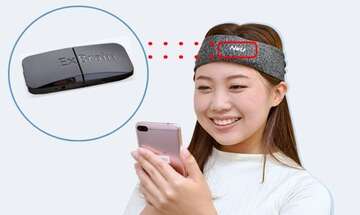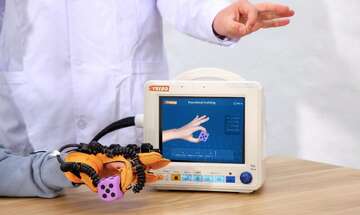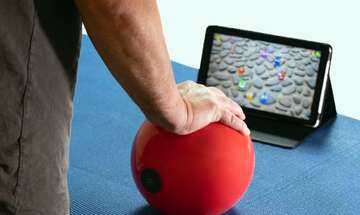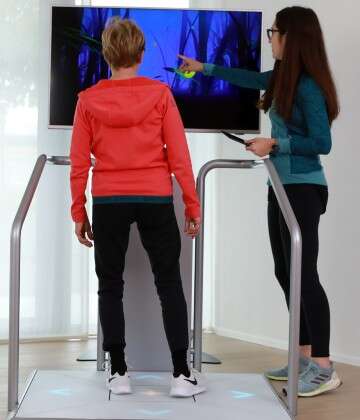NeuroRehabLab Harnesses New Technologies to Advance Neurological and Motor Rehabilitation
 images: NEUROREHABLAB
images: NEUROREHABLAB The NeuroRehabLab at the University of Madeira uses the latest scientific findings and innovative technologies to develop the next generation of tools for cognitive, neurological and motor rehabilitation.
The NeuroRehabLab, an interdisciplinary team of researchers at the University of Madeira in Portugal, combines the latest insights in neuroscience, technology and clinical practice to create sophisticated tools for motor and cognitive rehabilitation and improve the lives of people with special needs. The team focuses on neuroscientific research to better understand the brain mechanisms that are critical to functional recovery and their efforts in the field of serious games have yielded a range of effective, entertaining, low-cost solutions that train users’ brain to recover lost functionality after a central nervous system lesion.

NeuRow, one of these solutions, is an online rowing platform that uses a virtual reality environment and brain-computer interfaces to train motor-imagery, a mental rehearsal of movement that appears to use the same control mechanisms as actual movement. Motor-imagery is used as a basis for various neurorehabilitation techniques, as well as for the development of brain-computer interfaces for stroke patients and other people with physical disabilities. Combined with an immersive VR setting and feedback, motor-imagery training provides users with a more engaging experience, immersing them in various contexts where they can control different elements of their environment using only mental imagery.



The NeuroRehabLab has also developed the Neurorehabilitation Training Toolkit (NTT), a rehabilitation tool that trains motor deficits, with an emphasis on those resulting from stroke. Designed for use at home, to supplement regular rehabilitation, the system combines VR technology with games and storytelling to deliver repetitive, bimanual, task-oriented training tailored to address the needs of each individual patient.



RehabCity is an online tool created for cognitive rehabilitation. It engages users with a simulated city that they must navigate to reach specific short-term goals. The game, which can be customized for each user, was designed to improve users’ attention, memory and executive functioning and it offers frequent feedback to increase the player’s sense of self-efficacy and motivation.


Ecosistema Marinho, an interactive learning tool for users with Down Syndrome, uses virtual reality gaming to support learning, with a focus on collective learning in small groups. Developed in collaboration with the Madeira Whale Museum, the tool aims to motivate and stimulate users, as well as to encourage their initiative and autonomy, while engaging them in various association and composition/decomposition tasks.

In addition to these solutions, the NeuroRehabLab has two ongoing interdisciplinary research projects that combine the latest neuroscience findings with novel technologies to support, optimize and advance rehabilitation and healthcare.



RehabNet is a project launched to develop a new rehabilitation paradigm that can deliver motor rehabilitation to all patients, anywhere, at a low cost. The project is based on insights from several research areas, including neuroscience, neurofeedback, robotics, clinical research and human-computer interaction. It uses a unique wearable robotic device that restores correct limb position and combines a VR training task with robotic assistance that automatically adjusts to the user. The main objective of the project is to develop an upper limb rehabilitation system that not only trains motor function, but also tracks and collects behavioral data on patient performance and data on synchronized brain activity during the recovery process to help researchers develop a new neurofeedback paradigm that can be used by people recovering after a stroke, either in a clinical setting or at home. The RehabNet project brings together the NeuroRehabLab team and collaborators at the Quality of Life Technologies Center of Carnegie Mellon University in Pittsburgh, Pennsylvania, the Massachusetts-based medical robotics company Myomo, the Madeira Interactive Technologies Institute, and the Madeiran Public Health System – SESARAM.

The AHA: Augmented Human Assistance project also addresses several areas – physiological computing, human-computer interaction, serious games and robotics – aiming to develop the next generation of technologies that have the potential to improve diagnoses, deliver innovative therapies and reduce costs in healthcare. The objective of the project is to develop a Robotic Assistance Platform to train patients with motor deficits, to sustain active aging and to encourage and support healthy lifestyles using augmented reality physical training tools, biosensors to track and deliver exercise data to increase self-awareness, and a mobile robotic platform to offer augmented assistance. Watch the video below to see the first version of the AHA prototype and learn about some of its applications.


 SEND INQUIRY
SEND INQUIRY










